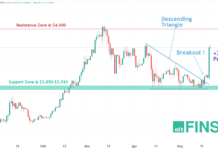If something is good to be true, it probably is. With rising interest in digital currencies such as Bitcoin and Ethereum, fraudsters are luring people into scams with the promise of high returns.
Why do people fall for these types of scams repeatedly? According to Bob Wood, founder of Nexxus Global Rewards Community, two ingredients make people fall for scams – ignorance and greed. In 2016 he explained new technologies are not understood by people, enabling scammers to mix truth with deception to trick unaware people with false promises.
“Cryptocurrency scams fall into two main categories 1) opportunities pretending to be cryptocurrency, and 2) real cryptocurrencies with no real value creator.”
Scams are often spread within social circles based on trusted relationships. People should be aware scammers are actively looking for ways to deceive people out of their money.
Know what you’re getting into
Proceed with caution. Before supporting a venture take the time to research what exactly is offered.
Too-good-to-be-true emails
Social media plays a prominent role in scamming people. Mark Steward, director of enforcement, FCA, explained: “As people have become more skeptical of investment-related cold calls and consumer habits have changed, investment fraud has moved online and to social media.”
Tip: While adverts sound appealing regard them with suspicion. Reject unsolicited investment offers whether online, via social media, email or by phone.
Initial Coin Offering (ICO) fraud
Last year ICOs raised over $3.7 billion. Pioneered by Ethereum in 2014, fundraising took off in 2017, outpacing venture capital investing for blockchain startups. ICOs, though are still unregulated and risky.
Prodeum ICO promised to revolutionize the fruit and vegetable industry pulled a recent exit scam, shutting down its website, leaving only the word ‘penis’ to greet scammed investors. Other notable scam ICOs include PlexCoin, shut down by the U.S. Securities and Exchange Commission (SEC) in December. A $15 million fraud that took money from thousands of investors promising a 13-fold profit within a month. Vitalik Buterin, Ethereum’s founder warned people about ICOs bearing his name. Ernst & Young suggests around $400 million worth of ICO funds have been lost or stolen via hacks from $3.7 billion.
Tip: Before putting money into an ICO, ask questions. Avoid offers that are too good to be true.
Suspicious landing pages
A rising interest in crypto brings new investors. Many land on fake landing pages for popular digital currency exchange platforms. Binance cryptocurrency exchange is one such example. Next Web reports copycat scammers were using a technique known as Punycode. Through this method the fake domain ‘xn--inance-hrb.com’ could be displayed as ‘ƅinance.com.’
Tip: Check the certificates in your browser. As this post states, vulnerabilities in Chrome, Firefox and Opera web browsers means hackers can display fake domain names as real services.
Fake digital wallets
Fake virtual wallets often appear online or in mobile app stores. In the Bitcoin Gold wallet scam over $3.3 million was stolen in a scam taking advantage of users who wanted to claim their Bitcoin Gold.
MyEtherWallet warned customers about a fake MyEtherWallet in December. Prior to its removal iOS App Store, TechCrunch noted 3,000 people paid $4.99 for the app.
Tip: Before selecting a digital wallet provider, do your research. Only providers with a solid track record should be used.
Malware steals Bitcoin
Malicious malware is something that computer owners worry about. Now, though, a new category of malware has begun to appear, one that steals Bitcoin. YouTube shut down adverts taking viewers’ computing power to mine cryptocurrencies. It was only after users noticed their computers were running slowly, and they received alerts from their anti-virus protection, they realized they were under attack.
Tip: Have a robust anti-virus protection and active firewall to protect your computer.
Cyptocurrency market remains an attractive sector, but investors face risks. As an unregulated industry, it’s up to the investor to ensure their protection and the safety of their funds.
















